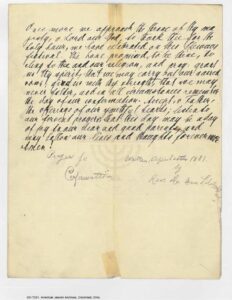Contributor(s): Shared on: Categories: Tags: | Contribute a translation | Source (English) |
|---|
|
Once more we approach the throne of thy majesty, o Lord our God,
to thank thee for the holy hour,
we have celebrated on this Shavuos festival. | |
We have promised to be thine,
to cling to thee and our religion,
and pray:
grant us thy spirit
that we may carry out out sacred vows,
gird us with thy strength,
that we may never falter,
and in all circumstances
remember the day of our confirmation. | |
Accept, o Father,
the offerings of our youthful hearts;
listen to our fervent prayers,
that this day may be a day of joy
to our dear and good parents,
and may [you] follow our loves and thoughts
forever more.
Amen! |
This “Prayer for Confirmation” was offered by Rabbi Dr. Max Lilienthal on Shavuot (20 April 1881), a manuscript copy of which it found its way into the collection of the Jacob Rader Marcus Center of the American Jewish Archives, Cincinnati, Ohio. Many thanks to the Jewish Women’s Archive for providing a copy of the manuscript through their website. Source(s) Prayer for Confirmation by Rev. Dr. Max Lilienthal. April 20, 1881.
(via the Jewish Women’s Archive and Courtesy of The Jacob Rader Marcus Center of the American Jewish Archives, Cincinnati, Ohio)
Rabbi Max Lilienthal (November 6, 1815 – April 6, 1882) was a German-born adviser for the reform of Jewish schools in Russia and later a rabbi and proponent of Reform Judaism in the United States. Lilienthal served as a rabbi for several years after his arrival in New York City in 1845, including at the Anshe Chesed Synagogue. He opened a Jewish school in 1850. In 1855, he moved to Cincinnati to become an editor of The American Israelite and serve as rabbi of Congregation Bene Israel. As a rabbi in Cincinnati, he promoted Reform Judaism. He wrote for several publications and was an advocate for both Jewish and secular schools, teaching at Hebrew Union College and serving on the Cincinnati board of education. Lilienthal was later an active supporter of the movement to abolish slavery in the United States, though a minority of American Jews, primarily those in the South, were themselves slaveholders and disagreed strongly with his position. Aharon Varady (M.A.J.Ed./JTSA Davidson) is a volunteer transcriber for the Open Siddur Project. If you find any mistakes in his transcriptions, please let him know. Shgiyot mi yavin; Ministarot naqeni שְׁגִיאוֹת מִי־יָבִין; מִנִּסְתָּרוֹת נַקֵּנִי "Who can know all one's flaws? From hidden errors, correct me" (Psalms 19:13). If you'd like to directly support his work, please consider donating via his Patreon account. (Varady also translates prayers and contributes his own original work besides serving as the primary shammes of the Open Siddur Project and its website, opensiddur.org.) Read a comment / Leave a comment (moderated) Works of related interest: |











Leave a Reply